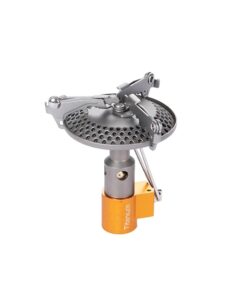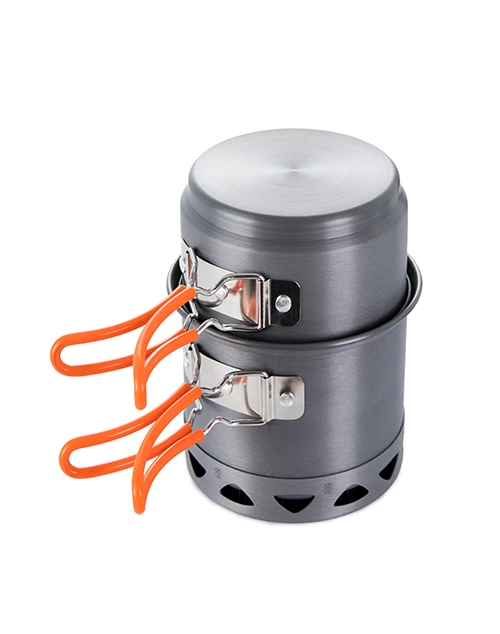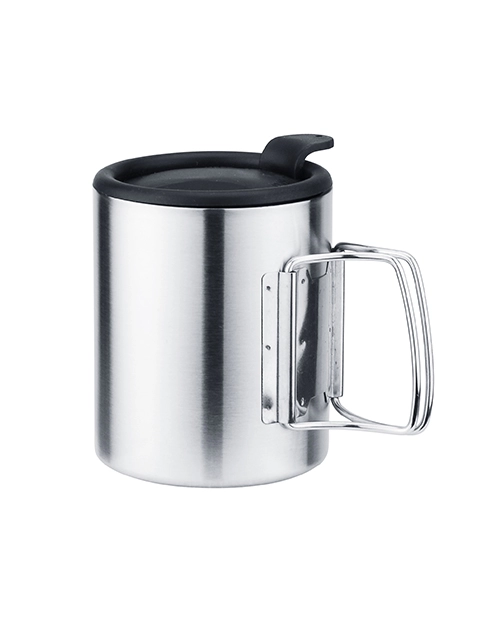 What do you need to consider before buying a cooking stove? You cannot just jump on a titanium or stainless steel camp stove as your portable burner. Each of the materials offers its own positives and negatives.
What do you need to consider before buying a cooking stove? You cannot just jump on a titanium or stainless steel camp stove as your portable burner. Each of the materials offers its own positives and negatives.
Titanium stoves are great for backpackers who want to travel light. If you have stainless steel stoves, they are one of the cheapest but even so, the best if we talk about long life. However, when comparing both of them, which one will suit you the best at camping?
We provide an in-depth comparison so that you can make a decision based on more informed grounds. We would look at every important factor, from weight and durability to heat efficiency, thus helping you distinguish one from another easily by its end.
Key Features of Titanium and Stainless Steel Camp Stoves:
Knowing some basic details as far as titanium and stainless steel models are concerned is very vital when it comes to camp stoves. Examples include titanium’s low density, which gives it strength while keeping it light in comparison with other metals. This material also offers excellent corrosion resistance, ensuring long-lasting use in any weather.
Nevertheless, stainless steel campfires are known for being tough yet affordable to acquire. Even though they weigh more, they can withstand rough handling and extreme conditions better than titanium ones do.
Stainless steel stoves resist high temperatures without deforming, thereby making them more reliable over time—something that cannot be said of others. The material is naturally rust-resistant, guaranteeing its survival even in humid or wet surroundings.
The use of titanium stoves is an excellent option for individuals who prefer fast cooking since they heat up quickly. Stainless steel stoves, however, do not retain heat as well. This quality helps cooks prepare meals with even temperatures over long periods of time.
With these specifications in mind, you will be able to select the most suitable stove for yourself. Depending on such camping specifics, your own decision could rely on any one of the above three factors.
Titanium vs Stainless Steel Camp Stove Weight Comparison
Looking at a titanium camp stove and the equivalent version in stainless steel, you straight away get how it is that those ultralight quotes go for titanium. The other major benefit is that titanium stoves are lighter than their stainless steel counterparts, often weighing as little as half the weight of one made from stainless steel. This great weight difference makes titanium a perfect choice when it comes to starting long journeys where any ounce counts.
The ultra-lightness of titanium stoves is appreciated by backcountry travelers, who are very particular about how many grams their packs carry. Shaving off a few ounces can significantly impact hikers undertaking such difficult terrain.
It should be noted that they possess certain benefits that outweigh their bulkier nature when compared with stainless steel models. With a greater weight comes a higher level of toughness and stability in stainless steel models when compared with lighter ones made from different materials whose delicate nature may fail them under harsh conditions.
The additional pounds associated with this type of camping cookware also result in better full-heat capacity, especially during extended cooking hours.
Titanium, being so light, is not only easy to carry but also influences the whole load on your backpack. A lighter stove can help save weight that could be used for other necessary things or food supplies.
Such flexibility becomes especially useful when going on long trips and having limited options for resupply.
However, those who plan items in their packs may think twice about stainless steel stoves because they add a lot of weight, which ultralight backpackers might not approve of.
Besides, it will depend on what kind of camping you plan. If it’s an overnight camping trip, not much is lost by the weight difference. However, for hikers and multi-day travelers, lessening the mass of a titanium stove may help reduce fatigue and provide a more enjoyable experience.
To sum up, different needs as well as priorities are one of the factors influencing whether titanium should be chosen over stainless steel for cooking with gas stoves. The choice between stainless steel stoves and titanium cookware comes down to what you value most as an outdoors person.
Titanium stoves are perfect if one wants to have a minimum pack weight, while stainless steels offer durability plus heat retention, which is useful in some situations only. It is important to understand these tradeoffs when choosing a stove that would suit your outdoor needs when going camping.
Titanium vs Stainless Steel Camp Stove Durability Test:
If you are planning to purchase a camp stove, then durability is one thing that you must look into. We wanted to first test and compare titanium vs. stainless steel camping stoves. We field-tested them side by side on a couple of trips. Here’s what we discovered:
Titanium Stoves Testing:
We conducted several tests to examine how durable our titanium stove was. Titanium is a light and strong material. The objective of our testing was to check for weaknesses under extreme conditions.
- Weather Resistance: The stove was exposed to heavy rainfall and snowfall. It did not rust despite being moistened by water. Even the stove, despite being exposed to high levels of humidity for long periods or equipped with many wonders, still worked perfectly. It was made from titanium, which had the advantage of being a material that offered good corrosion resistance.
- Impact and Handling: We dropped this cooking appliance from three feet up onto rocks below. While some dents appeared on its body, it continued working fine as before.
Stainless Steel Stove Testing
A stainless steel one went through the same tests. One of the most durable materials in design and production is stainless steel; products made of it are almost impossible to destroy or break. Therefore, we are interested in checking if this grill will meet such requirements or not.
- Weather resistance: We left our stainless steel stove out in the rain. Also, we had it exposed to high humidity levels. It did not show any sign of rust or corrosion. Stainless steel is highly resistant to weather and also highly durable.
- Impact and Handling: We dropped the stainless steel stove from the same height. It absorbed the impact very well, with less damage done to it. The only thing that happened was that some scratches occurred while its shape remained intact. The strength of stainless steel was observed in this case, where it could withstand more physical stress than titanium.
Comparing The Results
Titanium stoves are good when they are lightweight and weather-resistant as compared to other materials used for making such devices. However, on impact, they are weak materials that easily break once they fall down. This kind of kitchenware is great for backpackers who need a lightweight option but take care of their gear.
Stainless steel stoves offer long-lasting durability and stand up better under an impact test, which means more reliable performance in rugged environments, even if they are heavier themselves. They are able to survive handling abuse and remain operational.
Based on what we experienced with titanium stoves, these types of cooking appliances work best for those who value efficiency and lighter weights above all other factors. Hence, you must take caution not to get your pot dented during normal use since it might break upon falling down.
Unlike titanium, stainless appliances for outdoor use tend to be much more resilient, especially when you consider areas like backcountry camps where reliability is paramount, even though these options are heavier than others.
Heat Efficiency Titanium vs Stainless Steel Camp Stove
One of the most important features of any camp stove is heat efficiency. Our aim was to see how titanium and stainless steel stoves perform in real-life situations. For us to understand their heat efficiency, we carried out tests on these materials under different conditions.
Titanium Stove Heat Efficiency
Titanium is known for being an excellent conductor of heat. It warms up faster, which is a big plus when you are outside. As we experimented with it, the titanium stove had a tendency to boil water sooner than all others did. This becomes particularly useful when preparing meals that require practically no time or water that needs boiling on the run.
Moreover, less fuel is needed because titanium can effectively transfer heat. This helps save energy during long expeditions and commutes with less load.
However, titanium cools off quickly too. If one needs to keep food warm for long periods, this could be disadvantageous. This drawback can make it difficult to maintain a consistent temperature over time when used in cold weather conditions, as experienced in our test case scenario.
When the temperatures were very low, the titanium stove struggled to produce steady warmth. It would lose its heat so fast that food could not be left to simmer, or whatever cooking requires a steady temperature.
Efficiency of Heating in a Stainless Steel Stove
However, stainless steel takes longer to get hot but keeps the heat for a long time. This is what we realized when testing a stainless steel stove, which took some more time to boil. After that, though, it remained hotter than any other kind of stove.
For instance, when you are preparing meals that need an even heat supply, this type of stove comes in handy. The stainless steel stoves performed best in slow-cooking experiments where a consistent temperature was vital.
In addition, during long cooking sessions, we noted that the stainless steel versions are more economical on fuel. We reduced our fuel consumption because the heat would remain in the cooker for longer periods of time. This is beneficial, especially if one wants to save on fuel while away from home.
Comparing the results
Titanium stoves are great for fast boiling and short-term heating purposes. They can work well with ultralight backpackers who want efficiency but also need to fit everything within a small item like a pocket or pouch. However, for dishes needing steady heat, rapid cooling is not recommended.
Stainless steel stoves take longer to warm up and have better heat retention properties as compared to other types of stoves. These sorts of cookers are better adapted to more complex cooking activities.
This suits campers who should cook meals slowly on a low fire perfectly well compared to any other materials available, as they guarantee even distribution of heat, hence leading to uniformity in cooking processes.
FAQs:
1. How do you handle cleaning and maintenance titanium vs stainless steel camp stoves?
Titanium stoves can be cleaned with minimal effort; all it requires is a mild soap and wiping down. They resist rust, so not much maintenance is needed. But if you have stainless steel stoves, they do need that extra elbow grease to maintain their beauty and coloring. Polishing is important to make sure your rings still look great.
2. Which is better titanium or stainless steel camp stoves for cooking?
Titanium is the quickest to heat the materials up, so it is very good for boiling over a standard fuel source. But one thing that is possible with electric grills is that they cool quickly, so they are not a good option for slow cooking. Stainless steel stoves, on the other hand, retain heat better and provide a flat cooking surface for foods that should be cooked at steady temperatures. It all depends on whether you value quick or slow heat.
Conclusion:
The main determinant of your choice between titanium and stainless steel camp stoves depends on your camping priorities. For those who require lightweight equipment and rapid heating, titanium is perfect. It’s recommended for ultralight backpackers.
Nevertheless, stainless steel offers superior durability, heat retention, and greater reliability in the long run. This is good for individuals who count on such qualities. Weighing these trade-offs helps you select a stove that suits your camping style. This will lead to better outdoor experiences, which will be more enjoyable too.
ODM service
Looking for reliable camping stove supplier? At Deermaple, we specialize in ODM service, offering high-quality, innovative, best camping stoves tailored to your needs.
If you are interested in camping stove wholesale , please contact us.













